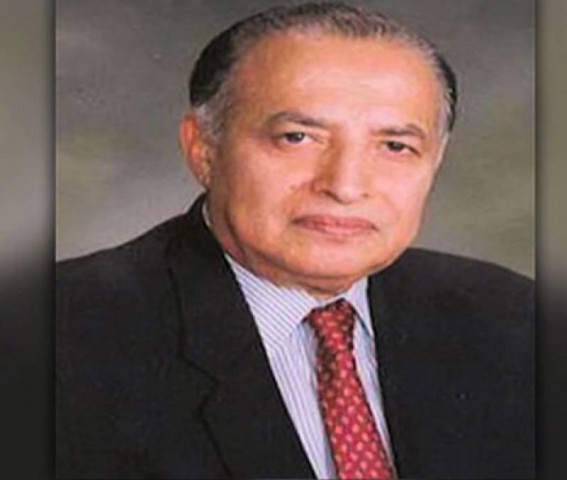Former CJP Ajmal Mian passes away
He will be remembered for his historic judgments such as in military courts case

Sindh High Court (SHC) Chief Justice Ahmed Ali M Sheikh, sitting and former judges of the SHC and Supreme Court (SC) and a large number of lawyers and relatives attended his funeral prayers offered at Mustafa Masjid in Phase I of Defence Housing Authority. He was laid to rest at the Mewa Shah Graveyard.
Justice (retd) Mian was born on July 4, 1934 in Delhi, India. He did his bachelor's in economics and political science from the University of Karachi in 1953 and received a law degree from Lincoln's Inn, London in 1957.
He started practicing law in what was then West Pakistan and was elevated to the rank of a judge of the SHC in 1978. He went on to become the SHC chief justice on September 4, 1988, and after a year, was elevated as permanent judge of the SC on December 10, 1989.
Justice (retd) Mian became the country's 14th top judge in the difficult time in 1997, when the then CJP Sajjad Ali Shah was stopped from performing his judicial and administrative duties in a controversial case following confrontation with the civilian government in the backdrop of the attack on the Supreme Court's building by the Pakistan Muslim League - Nawaz's (PML-N) leaders and activists.
Sindh to take IG matter to Supreme Court
At the time of the judicial crisis during the Nawaz Sharif's second term as prime minister, Justice (retd) Mian was the senior puisne judge of the apex court. However, he distanced himself from the matter by declining to sit on the bench that decided the case about then CJP Shah. A 10-member bench later made him the acting chief justice and he later succeeded Justice Shah as the permanent CJP.
Legal fraternity pays tribute
According to many members of the legal fraternity, Justice (retd) Mian was one of the most talented and upright judges the country ever had.
"Justice Ajmal Mian was one of the most upright and hardworking judges the Supreme Court of Pakistan ever had," remarked Barrister Salahuddin Ahmed. "I have never heard a single negative word about his rectitude," he said.
"In the very controversial times of the 1990s, he worked as chief justice of the top court. People criticised the role of many judges in Justice Sajjad Ali Shah's episode, but no finger has ever been pointed at Justice Mian's role," said Barrister Ahmed.
The late judge had expertise in civil and constitutional matters but lawyers believe that he had an inherent quality of excelling in any case brought before his bench.
"He had a unique art of authoring judgments which would be very comprehensive and would cite possibly each and every relevant case," recalled Barrister Ahmed, adding that "a single judgment authored by Justice Ajmal Mian still proves very helpful in understanding the issues to its core."
Memorable judgments
The legal fraternity also remembered the late judge for his key role in bringing the judiciary out of the influence of the executive.
Abrarul Hasan, a senior Supreme Court lawyer, said that Justice (retd) Mian rendered dozens of important judgments during his career as a judge of the high court and the apex court.
Supreme Judicial Council looks into LHC judge’s misconduct
One of them is the landmark judgment in the famous Sharaf Faridi case, which Justice (retd) Mian rendered as SHC CJ.
"In the Sharaf Faridi case, Justice Ajmal Mian held that the judiciary should be separated from the executive, which was ultimately done," the lawyer recalled. Hasan believes that this was a landmark ruling that later paved the way for the independence of the institution of judiciary.
The fraternity also acknowledges the former chief justice's role for the protection of the fundamental rights of the citizens, as he gave various rulings including the one which he rendered in the case of military courts' establishment.
The civilian government of the PML-N had set up military courts as part of measures to control the worsening law and order situation in Karachi in the 1990s.
Abrar cited that the bench headed by Justice (retd) Mian had annulled the establishment of the military courts by the civilian administration and held that the civilian administration had no lawful authority to do so unless an amendment was made in the Constitution.
In 2015, the apex court upheld the military courts' establishment through the constitutional amendment - a step taken in light of Justice (retd) Mian's judgment in 1998.
The late judge also served as the chairperson of the Supreme Judicial Council, chairperson of the Pakistan Law Commission and chairperson of the board of governors of the federal judicial academy.



















COMMENTS
Comments are moderated and generally will be posted if they are on-topic and not abusive.
For more information, please see our Comments FAQ